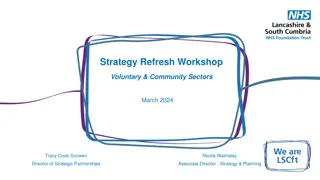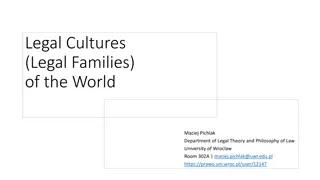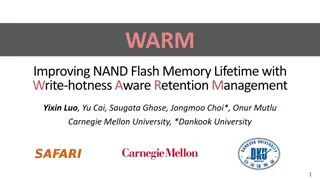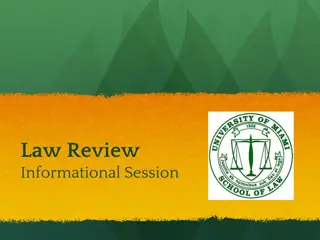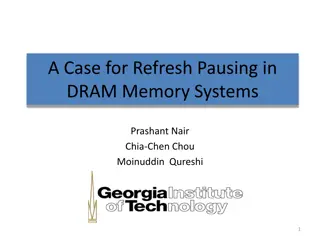
Understanding Review Factors for Treatment Support Orders in Mental Health Cases
Explore key considerations in mental health cases involving Treatment Support Orders (TSO), including factors such as time elapsed since the index offense, the need for direct medication supervision, and management of medication side effects. The case study of Mr. F highlights the interplay of these elements in determining the appropriate treatment approach.
Uploaded on | 2 Views
Download Presentation

Please find below an Image/Link to download the presentation.
The content on the website is provided AS IS for your information and personal use only. It may not be sold, licensed, or shared on other websites without obtaining consent from the author. If you encounter any issues during the download, it is possible that the publisher has removed the file from their server.
You are allowed to download the files provided on this website for personal or commercial use, subject to the condition that they are used lawfully. All files are the property of their respective owners.
The content on the website is provided AS IS for your information and personal use only. It may not be sold, licensed, or shared on other websites without obtaining consent from the author.
E N D
Presentation Transcript
Case Law Refresh Presenter: Virginia Ryan, Deputy President For MHRT Member training only February 2022
Agenda Cases looking at risk: Relevance of the passage of time: time since the index offence, time since any further offending and time since any inappropriate/challenging behaviour. Where a person is required to be directly supervised when taking their medication. Relevance of medication side effects. The source of risk. ECT and second opinions Cases considering the HRA2019: Interplay between the MHA2016 and HRA2019. Measuring unacceptable risk . Assessing least restrictive of a person s human rights.
AppealtoMHC0023 Background to the case Appeal by the patient (Mr F) against MHRT confirming TSO. Long history of chronic treatment-resistant schizoaffective disorder. Index offence 21 years ago. Mr F s treating psychiatrist updated report to MHC - no significant changes/events. Treating team s recommendation was to revoke TSO and make TA. MHRT s Reasons: the nature of the illness, the real prospect of rapid deterioration and consequent elevated risk, his resistant attitude to medication and direct, daily medication supervision had not ensured compliance. Assisting Psychiatrists advice was to accept the MHRT s findings that the TSO should remain.
Consideration of passage of time MHC noted: 21 years since the offence. No evidence of threatened or actual physical violence since the index offence. Last occasion of inappropriate, challenging behaviour was in late 2019. MHC: This is an important consideration for the Tribunal in its next review in terms of determining whether, because of the passage of time, the treatment support order can be changed to a treatment authority.
Side effects and medication supervision Mr F s concern was side effects of the medication. The MHC said: The question of the treatment that he is receiving is a matter for him to discuss with his treating team. (emphasis added) And: It is, in my view, an important consideration that the treatment support order is in place in circumstances where the appellant does require daily direct medication supervision. (emphasis added)
AppealtoMHC0023 Takeaways When reviewing a TSO, the following factors are important considerations: Time since the index offence, time since any further offending and time since any inappropriate/challenging behaviour. The need for daily, direct medication supervision supports the need for a treatment support order. Medication side effects are a matter between the patient and their treating team.
Appeal to MHC 025 Background to the case The MHRT revoked Mr R s FO and made a TSO. The AG appealed - revocation of the FO was premature because: The Tribunal failed to have sufficient regard to the nature of the index offences against [Mr R s] ex- partner and the ongoing custody dispute involving children between them resulting in increased stresses and risk.
Key circumstances in the case Mr R had: remained mentally well and free from psychotic symptoms no medication changes obtained a managerial position at a fast food outlet. acknowledged he had a mental illness, that medication helped and was happy to continue it and that illegal drugs worsened his illness. been reviewed monthly by his treating psychiatrist and FLO and fortnightly by his case manager. The chair of the ARMC supported a TSO as most appropriate. remained adherent to the conditions of his TSO and engaged with his treating team. shown improved insight and awareness of early warning signs.
Risk associated with family law matters The AG submitted the FO was necessary to minimise the risk to the community, particularly his former partner and her family as Mr R sought to re-connect with this child. The MHC noted: Mr R was legally represented in the contact/access matter and there was no evidence that any increase in stress arising from the proceedings increased the risk to the community, or his former partner. To conflate Mr R s legal rights in his family law matter as a risk that requires an FO is a risk category beyond the scope of an FO because: Mr R s former partner has the benefit of the no contact order through the MHRT and the DVO under other legislation. the steps taken by Mr R were through his lawyers, lawful and governed by the Family Law Act. Takeaway: Consider the source of risk here, the Family Law Act and the Domestic Violence Act were more appropriate vehicles to address family law dispute risks.
ECT - AppealtoMHC00D Second opinion refresh MHC: if a treating doctor wishes to administer ECT and the patient is not consenting, there needs to be a second opinion and that second opinion needs to be from a doctor who has examined the patient. The Chief Psychiatrist s policy Electroconvulsive Therapy and the QH Guideline The Administration of Electroconvulsive Therapy recommends a second opinion from another psychiatrist be obtained to inform the doctor s decision about applying for ECT.
When is a second opinion required? Not a legislative requirement (not in the MHA2016). MHC expected a second opinion where the patient is not consenting. Chief Psychiatrist recommends a second opinion when an application for ECT has been made to the MHRT Takeaway: a second opinion isn t always required, consider the views of the patient.
What makes a second opinion? MHC specified the second opinion should come from a doctor who has examined the patient. Chief Psychiatrist s policy refers to a psychiatrist. Takeaway: consider who the second opinion has come from and whether they have seen the patient or only undertaken a file review. Panels consider: Is a second opinion required? If a second opinion is provided: who provided it? did they examine the patient? what other evidence is before the panel?
Fitness for Trial - FCZ Evidence before the MHC FCZ charged with 7 offences including GBH, armed robbery, assault, serious assault of a Corrective Services officer, rape, assault with intent to commit rape and deprivation of liberty. Unanimous expert opinion that FCZ suffered from mild to moderate intellectual disability (full-scale IQ 55). There was a divergence of opinion as to FCZ s fitness for trial. A neuropsychologist and one of the psychiatrists view was that FCZ was permanently unfit whereas the other two psychiatrists thought court accommodations could ensure FCZ remained fit for trial. FCZ s legal representatives gave evidence of ongoing difficulties obtaining instructions from and explaining the legal process to him.
MHCs reasoning All experts agreed that the real issue was whether FCZ had the capacity to instruct counsel and follow the proceedings, which involved understanding the evidence in order to inform counsel whether it is true and who and whether there were other facts which qualified or explained the evidence. The issue was not low IQ of itself, but that FCZ suffered from cognitive fatigue and difficulty concentrating for extended periods and would struggle with comprehension and retention of new information. The MHC concluded that FCZ s significant cognitive deficits meant he would be unable to both follow the course of proceedings and instruct counsel. The MHC found accommodations would not assist, based on the evidence of FCZ s legal representatives that breaks and repetition had not been effective FCZ was found not fit for trial.
Takeaways The reasons published in this case work through the evidence provided by each of the experts and this helps the reader to understand how the MHC reached its conclusion. It is useful to see how the MHC compared, contrasted and weighted the different expert opinions. The reasons set out the rules of interpretation from case law which are useful in determining fitness for trial. The reasons consider the standard to apply for the Presser criteria by looking at cases: R v M: Questions of unsoundness of mind aside, the public interest warrants the trial of persons accused of criminal offences whether their level of intellectual capacity be normal or otherwise. [par 58] Ngatayi v The Queen: It is notorious that many crimes are committed by persons of low intelligence, but it has never been thought that a person can escape trial simply by showing that he is of low intelligence. [par 57]
Human Rights - AppealtoMHC0024 / GLH Background to the case The FO was imposed as a result of random and violent offending in 2002. GLH had a diagnosis of paranoid schizophrenia with a secondary diagnosis of mental and behavioural disorders due to a multiple drug use and tobacco dependence syndrome. He had a strong, supportive relationship with his mother and visited his sister and her children (all under 10) approximately twice per week. GLH was an Indigenous Australian man who took pride in his cultural role in the community. He had a long history with mental health services, with many hospital admissions in the context of substance use and breaching conditions of his FO.
Background continued MHRT confirmed GLH s FO (community category) but removed a condition which provided that GLH not have unsupervised contact with children. AG appealed to MHC. AG s ultimate submission was that the condition should remain (carving out an exception that he is allowed unsupervised contact with nieces and nephews). GLH s counsel argued that the condition is unnecessary to manage risk and so is not required. GLH submitted a question of law to the MHC under the Human Rights Act: What consideration the MHC must give to the Human Rights Act in conducting the review of the FO. The QHRC intervened in the proceedings and made submissions.
QHRCs position The question for the Court on the appeal was whether the condition that GLH must not have unsupervised contact with children was necessary to mitigate an otherwise unacceptable risk posed by him to their safety. If it was agreed the condition was unnecessary, the MHRT s decision to remove it should be confirmed. That approach was consistent with the proper exercise of power in light of the fundamental principle of the MHA2016 of adopting the least restrictive practices and the requirement to act compatibly with human rights. GLH s family and cultural rights should have been given due weight in the exercise of discretion, particularly, but not exclusively, due to their protective value where these rights are not inconsistent with the dictates of public safety.
MHCs view on human rights Looking at the provisions of the MHA2016, a congruent approach to the conditions of a FO means that they are only imposed if they limit human rights where this is necessary in order to reduce or maintain the risk posed by the person to a not unacceptable level . In deciding whether to reimpose the condition, it was necessary to consider the compatibility of any decision with the human rights contained in the HRA2019. The MHC considers that the provisions of s5 (Principles of the Act) of the MHA2016 are already compatible with the HRA despite being expressed in slightly different terms.
In deciding whether to add/amend a condition It is important to consider whether the safety of the community is exposed to unacceptable risk. The question is not whether there is no risk there is always some risk but whether the risk is unacceptable. It is the overall effect of the multiplicity of considerations in the individual facts and circumstances of the case which must be considered. There must be sufficient likelihood of the occurrence of the risk in combination with the magnitude of harm if the risk eventuates and any other relevant circumstances which make the risk unacceptable. Consequently, even a relatively high risk of reoffending may be reduced to a risk that is not unacceptable when other circumstances are considered. The flexibility means that it can be calibrated to the nature and degree of the risk in particular cases, and conditions to address the risk must be proportionate or no more onerous in the extent of their limitation upon human rights than required.
MHCs decision GLH continued to use substances despite education and assistance but that use was not leading to objective risks. The treating psychiatrist considered access to GLH s nieces and nephews protective as GLH did not use substances when in their presence. GLH was concerned he would not be able to fulfil his obligations in the community as an uncle and that was a source of frustration, demeaning his role and character in the community. He saw his role as protecting the children. GLH did not display any recent inappropriate behaviour and the index offending was 19 years ago, when psychotic. The treating psychiatrist could not identify any risk factors specific to children. The MHC held the risk to children was no greater than the risk to other people in the community. So, the MHC was not satisfied that there was an unacceptable risk for GLH to have unsupervised contact with children. The condition was not reinstated.
AppealtoMHC017 Another MHC case regarding human rights The patient appealed the MHRT s decision to confirm her TA. The patient argued the TA was unreasonable and restrictive because it prevented her from receiving specialised therapy in a private facility. The MHC held: the MHRT properly considered the treatment criteria and there was no less restrictive way for the patient to receive the required treatment. the limitation on the patient s human rights were reasonable and justified, noting: The TA was confirmed using the criteria under MHA2016 and was therefore lawful and within jurisdiction of the Act. The patient s human rights under s17 (involuntary medical treatment) were balanced against a risk to her health and wellbeing should she not receive treatment and care under the TA. The patient s hearing took place before a properly and lawfully constituted tribunal, she was provided copies of the relevant information before the hearing and was afforded an opportunity to present her case to the MHRT.
Human Rights Supreme Court case Owen-D Arcy v Qld Corrective Services Background: A prisoner was subject to solitary confinement due to risks to others. He was convicted of murder and since sentencing, of a number of violent offences in custody: GBH for biting and removing a portion of a Corrective Service Officer s ear, attempted murder and unlawful wounding. Corrective Services decided to continue the prisoner s solitary confinement by 6 months (on top of the prior 7 years of confinement). MHC held that certain human rights were not engaged: s17 right not to be treated or punished in a cruel, inhuman or degrading way insufficient evidence to show that solitary confinement conditions met the level of severity or intensity required to invoke right. s29 right to liberty right is concerned with the fact of detention and not the conditions of detention.
Courts findings Section 30 humane treatment when deprived of liberty was engaged. It was clear the prisoner was subject to hardship or constraint beyond the hardship or constraint that all prisoners experience by virtue of being deprived of their liberty. The Court expected that when the decision-maker was considering whether there were any ways to avoid limiting the person s human rights, the decision-maker would detail: the other alternatives considered and why they were not suitable; OR why they considered that there were no suitable less restrictive alternatives. The decision-maker should not simply state their belief that there were no alternatives.
Members website resources 1. Case Bank Human Rights Cases (Member Resources > Human Rights Tribunal Resources). 1. Mental Health Court Case Library (Member Resources > Case Law). 1. Mental Health Court appeals useful summaries (Appeals to the MHC).





